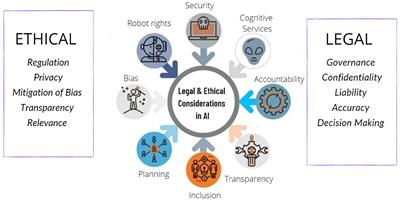Artificial intelligence, or AI, has permeated almost every facet of our lives, from virtual assistants on our smartphones to advanced recommendation algorithms on streaming platforms. However, its influence extends far beyond these conveniences, touching upon some of the most crucial aspects of our existence, including our mental health. In this blog post, we delve into the opportunities and ethical concerns that AI presents in the realm of mental health care.
The Promise of AI in Mental Health
AI’s potential to revolutionize mental health care is nothing short of remarkable. Here are some key opportunities:
Early Detection and Diagnosis: One of the significant advantages of AI is its ability to analyze vast datasets quickly. In the context of mental health, this means the potential for early detection and diagnosis of conditions like depression, anxiety, and bipolar disorder. By analyzing a person’s speech patterns, social media posts, or even physiological data, AI algorithms can identify signs of distress and alert healthcare professionals or individuals themselves.
Personalized Treatment Plans: Mental health is highly individualized, and what works for one person may not work for another. AI can analyze a person’s medical history, genetic makeup, and responses to different treatments to create personalized treatment plans. This tailoring of treatment can improve outcomes and reduce the trial-and-error aspect of mental health care.
24/7 Support: AI-powered chatbots and virtual therapists can provide round-the-clock support to individuals in need. These chatbots can engage in conversations, provide coping strategies, and monitor the user’s mental state. This continuous support can be particularly valuable for those who may not have immediate access to human therapists or counselors.
The Ethical Concerns
While the potential benefits of AI in mental health care are clear, there are significant ethical concerns that must be addressed:
Privacy and Data Security: To function effectively, AI systems require access to large amounts of personal data. This includes not only medical records but also intimate details about an individual’s mental and emotional state. Protecting this data from breaches and misuse is a paramount concern. Ethical guidelines and strict regulations must be in place to ensure that sensitive information remains secure.
Bias and Fairness: AI algorithms are only as good as the data they are trained on. If the data used to train these systems is biased or incomplete, it can lead to unfair treatment recommendations. For example, if an AI system predominantly learns from data from one demographic group, it may not provide accurate recommendations for individuals from other groups. Addressing bias in AI algorithms is a critical ethical challenge.
Lack of Human Touch: While AI can provide valuable support, it should not replace human therapists entirely. The human touch, empathy, and understanding that mental health professionals offer are irreplaceable. Over-reliance on AI for mental health care could lead to a dehumanized approach, potentially undermining the therapeutic process.
Accountability and Transparency: As AI plays a more significant role in mental health care, questions of accountability arise. Who is responsible if an AI system makes a wrong diagnosis or recommendation? Establishing clear lines of accountability and ensuring transparency in AI decision-making processes is essential to maintain trust in the healthcare system.
Striking a Balance
The integration of AI into mental health care is inevitable, given its potential to improve accessibility and outcomes. However, it’s crucial to strike a balance between harnessing the benefits of AI and addressing the associated ethical concerns.
Data Governance: Establishing robust data governance frameworks that prioritize privacy and security is paramount. Data should be anonymized, encrypted, and stored securely to prevent unauthorized access.
Bias Mitigation: Developers should actively work to mitigate bias in AI algorithms by diversifying training data and implementing fairness checks. Regular audits of AI systems can help identify and rectify bias.
Human Oversight: AI should complement, not replace, human mental health professionals. Human oversight of AI-driven recommendations and treatment plans ensures a more holistic and empathetic approach to mental health care.
Regulations and Standards: Governments and regulatory bodies should create clear guidelines and standards for the use of AI in mental health care. These regulations should address issues of accountability, transparency, and data protection.
In conclusion, AI offers exciting opportunities to transform mental health care by enabling early detection, personalized treatment, and continuous support. However, addressing the ethical concerns surrounding privacy, bias, and the human touch is paramount to ensure that AI serves as a valuable tool in improving mental well-being. Striking a balance between harnessing AI’s potential and safeguarding ethical principles is essential to make meaningful progress in this critical area of healthcare.






